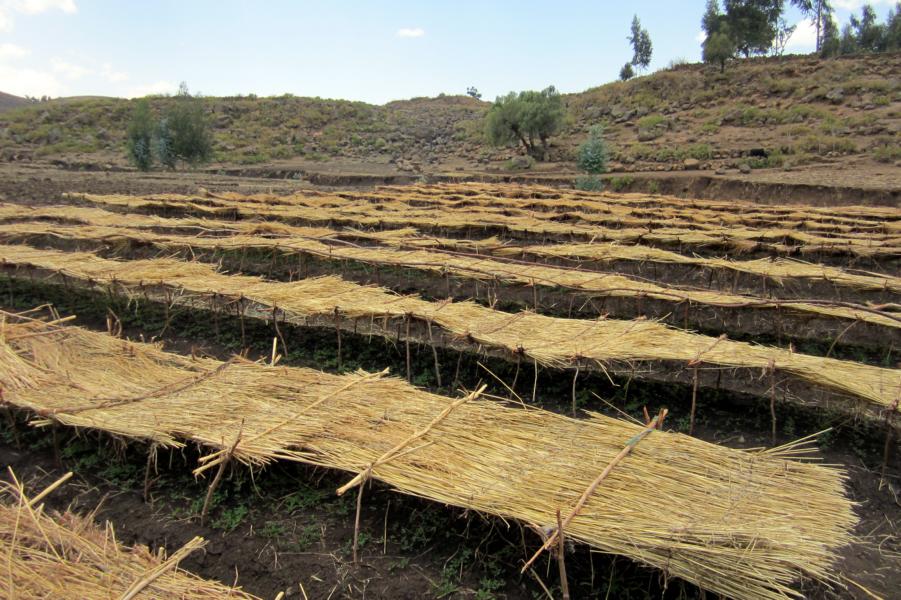Der nachfolgende Artikel von Lisa Taschler erschien am 8. Mai auf der Homepage des Äthiopischen Roten Kreuzes.
Why it is time to take the weather seriously
A slight change of temperature or alterations of rainfall patterns go largely unnoticed in the big cities of the world. However, if you earn your living through agriculture you might not react to such changes with the same calmness as the city dwellers. And if you are a subsistence farmer in a developing country such as Ethiopia, weather is much more for you than a topic for small talk with your neighbour.
For the people living in Senbetge, a district in the North of Ethiopia, close to the ancient city of Gondar, climate change is an issue of life and death. It is one of the poorest districts in the area in terms of infrastructure and social services and 99% of the community rely on farming for their livelihood.

Life has never been easy in this rural area which is not only affected by droughts but also prone to flooding. But in the last years conditions have worsened as global climate change as well as local deforestation show their consequences. ‘When I was young the earth was good and we harvested three times per year. Now we have only one harvest and it doesn’t last long’, says one of the elders of Hamusite, with 60 houses the biggest village in the area. ‘Before we knew when the rain would come, we could read the signs, but now the rain often comes too early or too late and it is not enough for our fields’, recounts another farmer. Rainfalls have become erratic in the region and droughts occur more often while the community does not have the resources to mitigate the consequences of failed harvests. Another recent phenomenon is the falling of hail (not known in this area before) that destroys crops and frightens animals and people alike.
But this is not the end of the story because the risk of a disaster is not only defined by natural hazards but also by the capacity of a community to respond. The farmers in Senbetge recognize the changes around them and do their best to adapt to the new circumstances. Their resources are limited but their motivation is high and therefore a new project by the Ethiopian Red Cross Society and the Austrian Red Cross, financed by ADA (Austrian Development Agency), has found much positive resonance. The multi-dimensional project aims at reducing the vulnerability to climate related disasters through building community resilience, promoting advocacy and community actions. This means various activities are implemented together with the community in the areas of water and sanitation as well as disaster risk reduction. One component of the project – and our current focus – is to construct hand dug wells to increase the access to safe drinking water from less than 1 percent to around 75 percent. The provision of safe drinking water will increase the overall quality of life for the community of Senbetge as it will also decrease wide-spread diseases such as diarrhoea. Other components of the project aim at reducing food insecurity through augmenting the annual crop yield. Measures planned include the construction of terraces, dams and trenches to protect against flooding and decrease the erosion of precious soil, while the implementation of irrigation schemes and the nursing of tree seedlings aim at improving the condition of the land and enable longer cultivation periods.

The goal of all these activities is the reduction of food insecurity and the prevention of future disasters in our project area of Senbetge. Ethiopia, the 5th most drought prone country in the world, has been in the news repeatedly in the last years and many vowed that devastating famines at the Horn of Africa should never happen again. To make this vow reality the focus of the international community has to shift from response to prevention and more support needs to be given for disaster risk reduction (DRR) projects. Such projects prevent not only human tragedy and the loss of life but are also cost effective. According to the United Nations Development Programme (UNDP), every dollar spent on reducing the risk of disasters could save 4 dollars in disaster response. However, recent reports reveal that only a very small part (around 1%) of international aid is directed at DRR programmes.
Our project in Senbetge aims at raising awareness on this issue, to show that we can not wait till a disaster strikes but that we, the local communities together with international organizations, have to act now in order to reduce vulnerability and prevent another tragedy.
